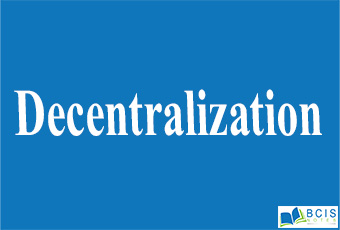
Decentralization
The process in which the power or authority present in the hands of the State and Central Government is taken back and is allocated to the local government it is called decentralization. In a decentralized organization, lower levels in the organizational hierarchy can make decisions. An example of a decentralized organization is a fast-food franchise chain. Each franchised restaurant in the chain is responsible for its own operation.
ADVANTAGES:
- The motivation of Subordinates- Decentralization improves the level of job satisfaction as well as employee morale, especially amongst the lower-level managers. Furthermore, it strives to satisfy the varying requirements for participation, independence, and status. Decentralization also promotes a spirit of group cohesiveness and spirit.
- Growth and Diversification- Under decentralization, every single product division attains sufficient autonomy to exercise their creative flair. In this way, the top-level management can create healthy competition amongst different divisions.
- Quick Decision Making- Another important pointer in the advantages and disadvantages of decentralization is that decisions are taken and executed by authorized personnel. This, in turn, results in faster and accurate decisions which are well aware of the real scenario.
- Better Supervision And Control- Lower level managers can alter production schedules and work assignments with adequate authority. They can even take disciplinary actions and recommend the promotion of their peers.
- The satisfaction of Human needs- Decentralization serves as an important tool for satisfying our basic need of independence, power, prestige, and status. A cadre of the satisfied manager is build up by this satisfaction as they feel responsible for the company’s betterment.
DISADVANTAGES:
- Difficult To Co-Ordinate- While talking about the advantages and disadvantages of decentralization, it is imperative to note that substantial autonomy is enjoyed by every single division. This, in turn, makes it difficult to coordinate the overall activity.
- Narrow Product Lines- Decentralized product lines need to be adequately broad so that autonomous units can flourish within the same. This might not be of much help in small business houses having narrow product lines. Lower levels in the organization also lack competent managers thus adding to the difficulty quotient.
- Expensive- In decentralisation, every employee takes responsibility for the better of the organisation so they work harder to achieve all the organisational objective. In return, they have to be paid more which sometimes proves to be very expensive for the company.
- External Factors- The trade union movement, market uncertainties, and government intervention might make it impossible to benefit the most out of decentralization.
You may also like Centralization

Leave a Reply